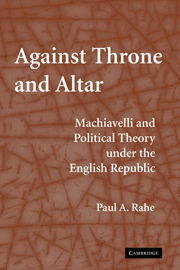Book contents
- Frontmatter
- Contents
- Acknowledgments
- Abbreviations and Brief Titles
- Introduction
- Prologue: Machiavelli in the English Revolution
- PART I MACHIAVELLI'S NEW REPUBLICANISM
- PART II REVOLUTIONARY ARISTOTELIANISM
- PART III MACHIAVELLIAN REPUBLICANISM ANGLICIZED
- PART IV THOMAS HOBBES AND THE NEW REPUBLICANISM
- Epilogue
- Index
PART II - REVOLUTIONARY ARISTOTELIANISM
Published online by Cambridge University Press: 21 July 2009
- Frontmatter
- Contents
- Acknowledgments
- Abbreviations and Brief Titles
- Introduction
- Prologue: Machiavelli in the English Revolution
- PART I MACHIAVELLI'S NEW REPUBLICANISM
- PART II REVOLUTIONARY ARISTOTELIANISM
- PART III MACHIAVELLIAN REPUBLICANISM ANGLICIZED
- PART IV THOMAS HOBBES AND THE NEW REPUBLICANISM
- Epilogue
- Index
Summary
Preface
It is impossible to slot John Milton into a pigeonhole. As one would expect from his spirited defense of intellectual liberty and from his trenchant critique of prior restraint of the press, the author of Areopagitica was nothing if not an independent mind. He was, to all appearances, a Puritan, and he professed to accept Scripture as his unerring guide. That he was a genuine believer few twentieth-century readers of Paradise Lost and Paradise Regained were inclined to doubt. But in an earlier and less credulous age, the poet Percy Bysshe Shelley argued that the first of these two poems “contains within itself a philosophical refutation of that system, of which, by a strange and natural antithesis, it has been a chief popular support,” and there are reasons to wonder whether Milton's fidelity to revelation was not, in fact, feigned. For all his apparent piety, Milton did not share the disdain for music, the theater, and the pagan classics evidenced by the more radical and austere among his fellow Puritans, and he championed divorce, looked favorably on polygamy, argued on biblical grounds against the doctrine of the Trinity, depicted Christ as God's adoptive son, endorsed a free-will doctrine similar to that of Arminius, embraced materialism, rejected creation ex nihilo, affirmed the indissoluble union of body and soul, and advocated a complete separation of church and state. By virtually any standard but his own, he must be judged a heretic.
- Type
- Chapter
- Information
- Against Throne and AltarMachiavelli and Political Theory Under the English Republic, pp. 101 - 103Publisher: Cambridge University PressPrint publication year: 2008



